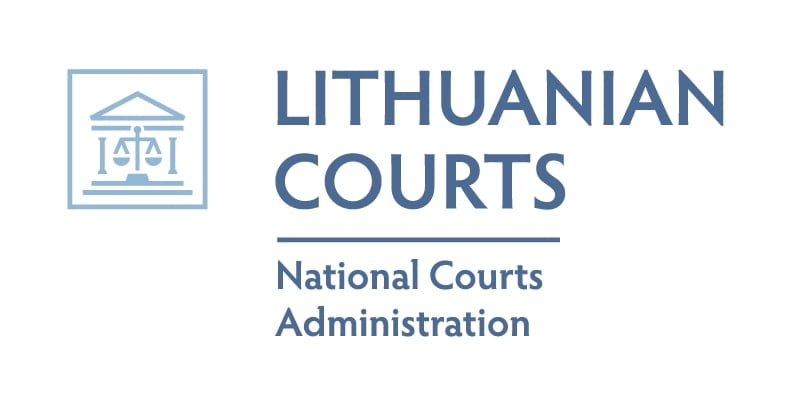National Courts Administration
On 14th March, 2002 Valdas Adamkus, President of the Republic of Lithuania signed the Law on the National Courts Administration and since 1st May 2002 authorised a newly formed institution, which is independent from the executive authorities – the National Courts Administration (NCA) – to provide services to the institutions of the self-governance of courts in pursuance of ensuring the efficiency of the court system, its government and organisation of work as well as the independence of judges and self-governance of courts.
The intention of the National Courts Administration is to comprehensively ensure the fluent work of the self-governance institutions, strengthen the national judicial system and improve the working conditions of courts.
Main activity spheres
The main activity spheres of the National Courts Administration are the following:
- Help to secure the independence of courts and judges, courts’ organisational autonomy;
- Upon its competence to ensure the close interrelations among courts and institutions of self-governance of courts;
- Help institutions of self-governance of courts to implement the assigned functions;
- Upon its competence to secure the fluent formation of the judiciary;
- Organise and ensure a centralized system of material-technical supply to courts;
- Ensure the award of the judicial retirement pensions;
- In order to ensure effective and rational management and use of state finances, it organize the implementation of the draft state budget, estimate drafts of the programmes and investment programmes of courts;
- Form and implement the strategy of common court information system;
- Aim for the effective functioning of the judicial system of the Republic of Lithuania;
- Conduct the internal audit in courts of the Republic of Lithuania;
- Implement the rights and duties of the founder and the owner of the Training Centre;
- Organise the trainings and qualification improvement of judges:
- drafts programmes of judicial training, rules of examining the acquired knowledge, qualification requirements for lecturers, annual education and qualification improvement plans, schedules;
-
collect, analyse, systemize information concerning the needs of judicial training and qualification development;
-
analyse and systemise information about the practice of foreign countries in the sphere of training and qualification development of judges;
-
organise and coordinate training and qualification improvement of judges in the Republic of Lithuania, foreign countries and in the international organisations.
The Training Centre of the National Courts Administration, which until 1st October 2011 has been directly subordinate to the Ministry of Justice, was established on 2nd January in 2007.
Strategic purpose
The strategic purpose of the Training Centre was to organize qualitative, purposeful and continuous training and qualification development of judges, assistants of judges, advisers of court chairmen and court division chairmen, court consultants, prosecutors and other lawyers, which fulfill the needs of Lithuanian legal system.
The organisation of the training process involved the identification of training needs, drafting and implementation of annual training plans and programmes intended for judges, organization and administration of separate seminars, analysis of information concerning training. Nevertheless, since 1st October 2011 the rights and duties of the founder of the Training Centre were transferred to the National Courts Administration and at present the Administration is directly responsible for the training and qualification development of representatives from the judicial system of Lithuania.
Contact
National Courts Administration
-
L. Sapiegos St. 15,
LT-10312 Vilnius,
Republic of Lithuania - [email protected]
- https://www.teismai.lt

-
Austria
- Federal Ministry of Justice
-
Belgium
- Judicial Training Institute
-
Bulgaria
- National Institute of Justice
-
Croatia
- Judicial Academy
-
Cyprus
- Judicial Training School
-
Czechia
- Judicial Academy
-
Denmark
- Court Administration
-
Estonia
- Office of the Prosecutor General
- Supreme Court
-
Finland
- National Courts Administration
- National Prosecution Authority
-
France
- National School for the Judiciary
-
Germany
- Federal Ministry of Justice and Consumer Protection
- Academy of European Law (ERA)
-
Greece
- National School of the Judiciary
-
Hungary
- National Office for the Judiciary
- Office of the Prosecutor General
-
Ireland
- The Judicial Council
-
Italy
- School for the Judiciary
- High Council of the Judiciary
-
Latvia
- Judicial Academy of Latvia
-
Lithuania
- National Courts Administration
- Office of the Prosecutor General
-
Luxembourg
- National Council of Justice
-
Malta
- Judicial Studies Committee
-
Netherlands
- Training and Study Centre for the Judiciary
-
Poland
- National School of Judiciary and Public Prosecution
-
Portugal
- Centre for Judicial Studies
-
Romania
- National Institute of Magistracy
-
Slovakia
- Judicial Academy
-
Slovenia
- Judicial Training Centre
-
Spain
- Centre for Legal Studies
- Judicial School
-
Sweden
- Judicial Training Academy
- Swedish Prosecution Authority
